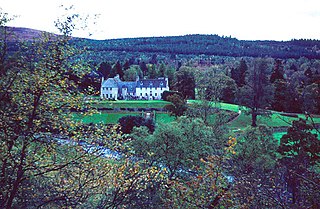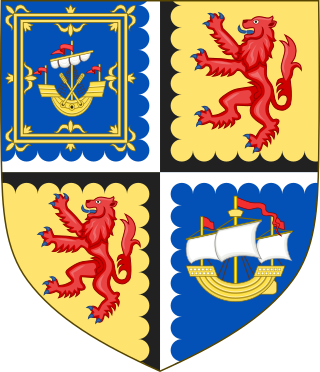Contents
| |||||
| Centuries: | |||||
|---|---|---|---|---|---|
| Decades: | |||||
| See also: | List of years in Scotland Timeline of Scottish history 1952 in: The UK • Wales • Elsewhere Scottish football: 1951–52 • 1952–53 1952 in Scottish television | ||||
Events from the year 1952 in Scotland .
| |||||
| Centuries: | |||||
|---|---|---|---|---|---|
| Decades: | |||||
| See also: | List of years in Scotland Timeline of Scottish history 1952 in: The UK • Wales • Elsewhere Scottish football: 1951–52 • 1952–53 1952 in Scottish television | ||||
Events from the year 1952 in Scotland .

Balmoral Castle is a large estate house in Aberdeenshire, Scotland, and a residence of the British royal family. It is near the village of Crathie, 9 miles (14 km) west of Ballater and 50 miles (80 km) west of Aberdeen.

Ballater is a village in Aberdeenshire, Scotland, on the River Dee, immediately east of the Cairngorm Mountains. Situated at an elevation of 213 metres, Ballater is a centre for hikers and known for its spring water, once said to cure scrofula. It is home to more than 1400 inhabitants and has had a long connection with the British royal family.

The River Dee is a river in Aberdeenshire, Scotland. It rises in the Cairngorms and flows through southern Aberdeenshire to reach the North Sea at Aberdeen. The area it passes through is known as Deeside, or Royal Deeside in the region between Braemar and Banchory because Queen Victoria came for a visit there in 1848 and greatly enjoyed herself. She and her husband, Prince Albert, built Balmoral Castle there which replaced an older castle.

Caithness is a historic county, registration county and lieutenancy area of Scotland.

The Cairngorms are a mountain range in the eastern Highlands of Scotland closely associated with the mountain Cairn Gorm. The Cairngorms became part of Scotland's second national park on 1 September 2003. Although the Cairngorms give their name to, and are at the heart of, the Cairngorms National Park, they only form one part of the national park, alongside other hill ranges such as the Angus Glens and the Monadhliath, and lower areas like Strathspey.

Cairngorms National Park is a national park in northeast Scotland, established in 2003. It was the second of two national parks established by the Scottish Parliament, after Loch Lomond and The Trossachs National Park, which was set up in 2002. The park covers the Cairngorms range of mountains, and surrounding hills. Already the largest national park in the United Kingdom, in 2010 it was expanded into Perth and Kinross.

Lochnagar or Beinn Chìochan is a mountain in the Mounth, in the Grampians of Scotland. It is about five miles south of the River Dee near Balmoral. It is a popular hill with hillwalkers, and is a noted venue for summer and winter climbing. At the foot of the mountain is a lochan, Lochan na Gaire, from which the mountain's name derives.

Laird is a designation that applies to an owner of a large, long-established Scottish estate. In the traditional Scottish order of precedence, a laird ranked below a baron and above a gentleman. This rank was held only by those holding official recognition in a territorial designation by the Lord Lyon King of Arms. They are usually styled [name] [surname] of [lairdship]. However, since "laird" is a courtesy title, it has no formal status in law.

Birkhall is a 210 km2 estate on Royal Deeside, Aberdeenshire, Scotland, owned by King Charles III. It is located alongside the River Muick to the south-west of Ballater.

Clan Sinclair is a Highland Scottish clan which holds the lands of Caithness, the Orkney Islands, and the Lothians. The chiefs of the clan were the Barons of Roslin and later the Earls of Orkney and Earls of Caithness.
Events from the year 1952 in the United Kingdom. This year sees a change of monarch.

The Pillar Box War refers to a number of politically motivated acts of vandalism against post boxes in Scotland during the early 1950s in a dispute over the correct title in Scotland of the new British monarch, Elizabeth II or Elizabeth I.

Brigadier James Roderick Sinclair, 19th Earl of Caithness, CVO, CBE, DSO was a British Army officer during World War II, hereditary peer and chief of Clan Sinclair.
Anne Hamilton, Countess of Huntly, was a Scottish noblewoman and a member of the powerful Hamilton family which had a strong claim to the Scottish crown. Her father James Hamilton, Duke of Châtellerault, 2nd Earl of Arran was heir presumptive to the throne of Scotland after Mary, Queen of Scots prior to the birth of the latter's son Prince James in 1566. Anne was the wife of George Gordon, 5th Earl of Huntly, Lord Chancellor of Scotland and a chief conspirator during the reign of Queen Mary.
Events from the year 1955 in Scotland.
Events from the year 1953 in Scotland.
Events from the year 1942 in Scotland.
Events from the year 1934 in Scotland.

Ardverikie House is a 19th-century Scottish baronial house in Kinloch Laggan, Newtonmore, Inverness-shire, Scottish Highlands. The house was made famous as the fictional Glenbogle estate in the BBC series Monarch of the Glen.

George Sinclair was a Scottish nobleman, the 4th Earl of Caithness and chief of the Clan Sinclair, a Scottish clan of the Scottish Highlands.
{{cite web}}: CS1 maint: unfit URL (link)